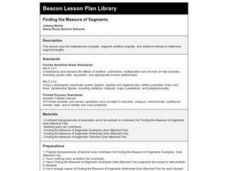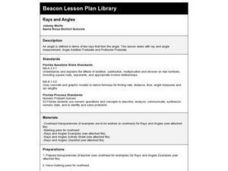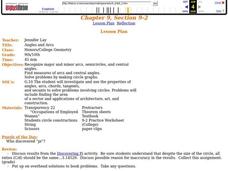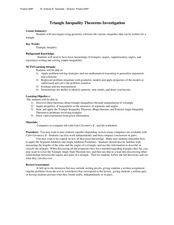Curated OER
Finding the Measure of Segments
Young scholars observe and solve examples of betweenness, ruler postulate, and segment addition postulate. They complete the Finding the Measure of Segments worksheet using the distance formula.
EngageNY
Triangle Congruency Proofs (part 1)
Can they put it all together? Ninth graders apply what they know about proofs and triangle congruence to complete these proofs. These proofs go beyond the basic triangle congruence proofs and use various properties, theorems, and...
Curated OER
Measuring Length: Practice A
Ninth graders investigate the segment addition postulate. In this geometry lesson, 9th graders explore the difference between equal and congruent in relation to segment length. The lesson includes an algebra application and a...
Curated OER
Rays and Angles
Students view examples of a ray, opposite rays, collinear rays, angles, and straight angles. They discuss and demonstrate how to use a protractor and complete worksheet problems on rays and angles.
Curated OER
Angles and Arcs
Students discuss the sum of central angles and use string to create them on circles. They find the measure and length of both minor and major arcs.
Students give examples of concentric, similar, and congruent circles and congruent arcs.
Curated OER
Determining Angle Measure with Parallel Lines
Students observe and solve examples of corresponding angle postulates, alternate interior angle theorems, and exterior and consecutive angles. They complete the Determining Angle Measure With Parallel Lines worksheet.
Curated OER
Triangle Inequality Theorems Investigation
Young scholars estimate and measure triangles. In this geometry lesson, students identify the relationship between three sides and a triangle. They use the inequality theorem to decide if a triangle will be formed or not.
Curated OER
Measuring Angles & Segments
Students view a PowerPoint for a warm-up lesson. They practice measuring around the classroom, measuring such things as the length and width of a desk, pencil, door, and book. Students use a website to practice measuring angles.
Virginia Department of Education
Inductive and Deductive Reasoning
Introduce pupils to the two types of reasoning, inductive and deductive. Classmates work in pairs or small groups to learn the difference between the two and apply these reasonings to develop valid conclusions.
Curated OER
Why Study History?
Pupils interpret historical evidence presented in primary and secondary resources. In this world history instructional activity, students research several historical events and their impact. Pupils compose essays that address the...









